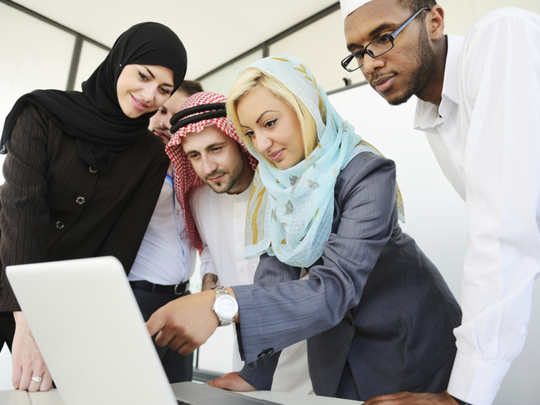
There is a digital gap between tech-savvy youth and older generations in the region. Social media, especially, has empowered the youth in the Middle East, who are either using it to express themselves or channelling its power to organise movements on a large scale. Meanwhile, older generations still mainly depend on mainstream media for information. This gap halts social and intellectual progress due to the unequal distribution of Information and Communication Technology (ICT).
Despite the burgeoning dependence on the internet, the Middle East is marred by high illiteracy rates that widen the digital divide. Across the Arab world, an estimated 57 million adults are illiterate. Another major problem is that many Arabs do not have access to proper infrastructure. Without solving these issues, any effort to minimise the digital divide may prove to be futile.
That said, governments lack the skill to absorb the growing influence of these younger generations through the internet. Additionally, they also do not have the strategies to minimise the digital divide. These Arab countries witnessed a proliferation of new media in the mid-1990s. Since then, many of them have continuously exerted efforts to ‘digitalise’ themselves. However, this ‘digitalisation’ is just in the physical sense: That is, there is the existence of technology in the region, but people do not know how to benefit from it.
The UAE, Egypt and few other Arab countries have developed physical spaces like the Dubai Internet City and Smart village in Cairo to allow tech companies to operate. In fact, the number of internet users in the Arab world is expected to reach 197 million by 2017. For instance, many Egyptians are using the internet as a platform to express their opinions freely. However, that does not necessarily mean that these citizens are digitally literate.
For people to be digitally literate, they have to possess the skills to be able to find and use the information online, apart from having the basic ability to operate technology. This definition both widens and complicates the digital divide within the Arab world. That is because people should educate themselves on how to use the platform to push for their societies’ progress.
Religious extremists are a good example of a digitally literate crowd. They tend to be tech-savvy and are able to spread their message and attract potential recruits. They are able to use technology to strengthen their ideology. Hence, by looking at their example, we understand the importance of technology in spreading ideas.
‘Freedom in the World’, Freedom House’s annual report on the state of political rights and civil liberties around the world, showed an overall decline within the Arab world in 2014 — with the exception of Tunisia. These states lost their ground due to their ongoing online surveillance. These restrictions have affected people’s personal freedom. Yet, despite the crackdown, there has been a 40 per cent increase in terrorism worldwide; mainly from this region, as recorded by the US State Department report in 2014.
The above example is to show that while some governments in the region fear the power of the internet, without capitalising on the opportunity to use it to the benefit of the society, other groups seem to understand its importance. Therefore, Arab governments need to accept the influence of the internet in shaping their societies. These governments should use the opportunity for development through embracing these tools to minimise the digital divide.
Aside from politics, a wide digital divide in the Arab world will lead to an economically divided region. A 2014 study released by Deloitte found that the internet is already an important medium in helping developing countries evolve into successful economies.
Progress within other countries is uneven when it comes to strategies to help narrow down the digital divide. Australia, India, Russia, UK and the United States are countries that have actively taken strategies from the private sector with support from the government to narrow the gap. However, they do face systematic problems, mainly social issues.
Lately, Facebook launched internet.org — connecting the world from the sky project. The project will be using drones, satellites and lasers to provide affordable basic internet in remote areas. Facebook harnesses its global power to narrow the digital divide. The company has struck partnerships with other technology corporates to help people gain access.
Facebook’s strategy revolves around how different communities should have internet access. However, these remote areas differ in the technology to be able to access the internet. Facebook’s internet.org is an example of how governments in the region can be creative when it comes to narrowing the gap. Governments could also start investing in media literacy curriculums in schools to create future digitally literate generations.
The point is that in order to invest in narrowing the digital divide, governments will face high costs given the current poor network infrastructure. They will also need to face the challenges of access to communities in remote areas and the high illiteracy rate. But, it is significant to narrow the gap because with more advanced digital education in the Arab world, we should expect further positive changes in Arab societies in terms of gender roles, health, commercial and social entrepreneurship, economics, traditions, cultures, waste management and even in farming.
Omnia Al Desoukie is a journalist, having worked in Egypt, Lebanon and the UAE. She has an MA in Media Studies from Syracuse University. Her research has been about how audiences react to online propaganda.








